A tuk-tuk isn’t your typical overlanding vehicle. But the team of Tuk South agree it’s a brilliant way to see Africa and capture the magic of its wild places. Tracks4Africa caught up with them when they were at Vic Falls to find out more. By Magriet Kruger
“It’s impossible to spend a day driving a tuk-tuk through Africa and not come out smiling at the end of it. People are always giving you a thumbs up, giving you a wave,” says Josh Porter. He’s one of four friends travelling from Kenya to Cape Town in a pair of tuk-tuks. And because the tuk-tuks go at such a leisurely pace, there’s enough time for passersby to call their friends over for a look.
“When people realise there are mzungu (white folk) in the tuk-tuk, it immediately breaks down the barriers,” adds Jasper Horsey. “It fosters really nice relationships in every village and town we stop in. Even the police – we haven’t had to bribe a single policeman. They just love the tuk-tuks, especially in Zimbabwe, where they’ve insisted on getting in and taking photos. And because they’re interested, we get to tell them about why we’re doing it.”
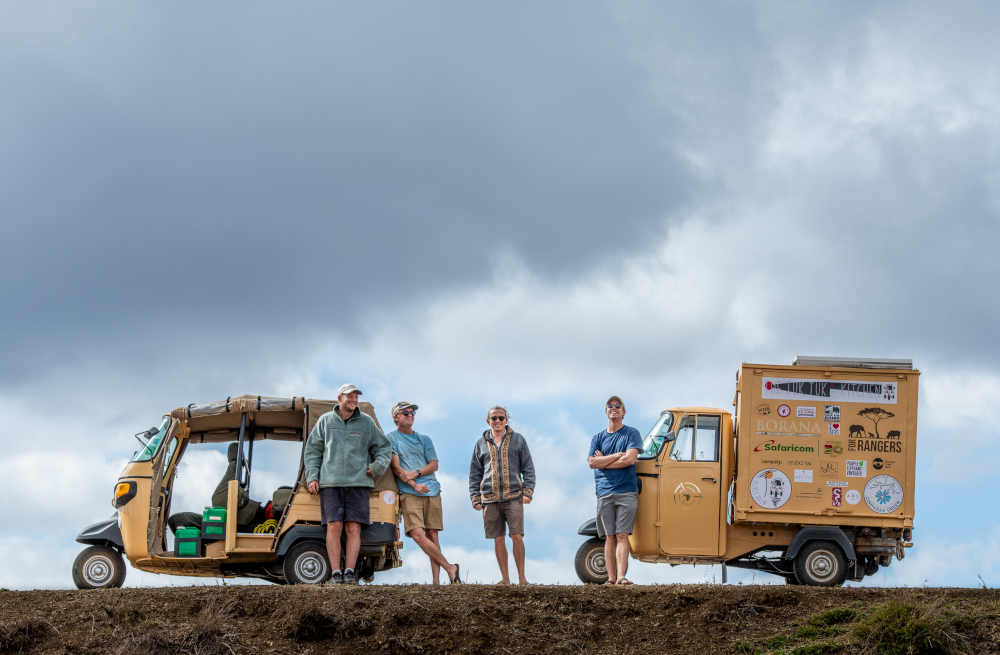
The foursome, known as Tuk South, are not exploring the wilds of Africa in a rickety city vehicle just for a laugh. Although there’s plenty of that. The reason they set off on their adventure is serious: to draw attention to the work wildlife rangers do.
The team, which includes Ivo Horsey and Robbie Thouless, came up with the plan during the pandemic. As tourism to Africa’s wild places dried up, both communities and conservationists took strain. So the Tuk South team decided to use their experience as videographers to raise money for rangers. For the past eight months, they’ve been bumping along little travelled roads to get the stories of these wildlife guardians.
The reality of tuk-tuk travel
What’s it like travelling African roads in a vehicle that’s essentially a souped-up scooter? “There is a sense of people feeling really sorry for you. You’ve got the suspension of a tricycle, with these tiny little tyres,” says Jasper. When overlanders come across them, they tend to give them pitying looks – but also warm welcomes. “It’s been such an eye-opening experience in terms of the camaraderie of the road.”
As for top speed, it’s about 55km/h, downhill. “And that’s on a really steep downhill with the wind from behind. Any type of uphill is the death of the tuk-tuk. We’re literally going 5km/h.”
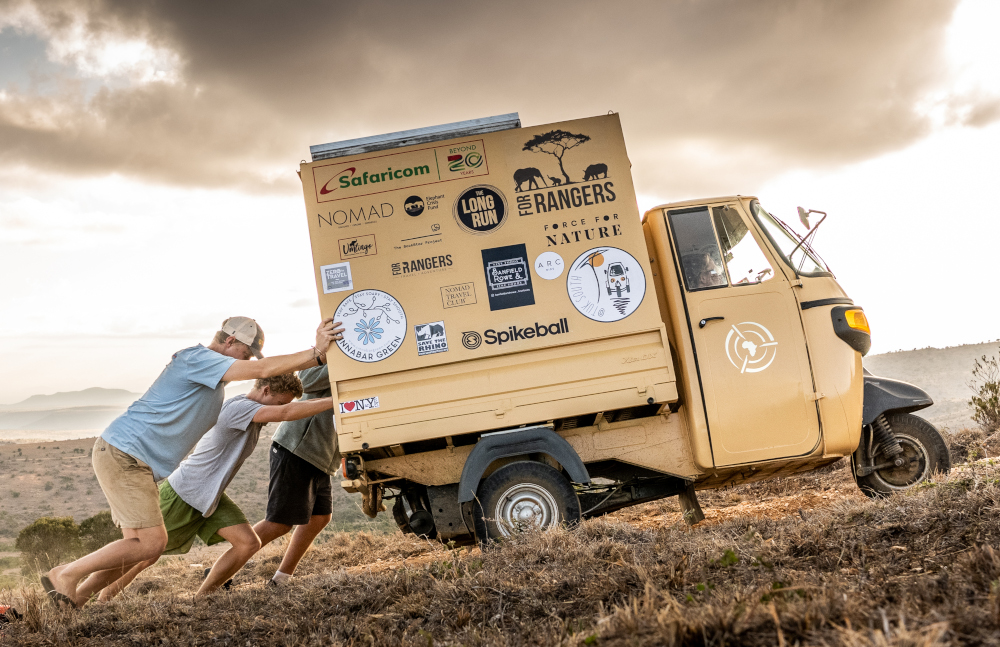
While you might assume it’s a struggle to overland in a tuk-tuk, they see it differently. “If you get stuck, you simply get out, pick up your tuk-tuk, take it out of the hole and keep driving,” says Josh. He and Jasper first discovered just how manageable tuk-tuk travel is during a trip to Sri Lanka. Whereas most travellers hire the auto rickshaws to take their surfboards to the beach, they drove theirs into a national park, complete with elephant, buffalo and leopard.
These overlanders see their slow speed as an advantage. On Tuk South’s recent drive from Karoi to Victoria Falls, they averaged just 16km/h. “There’s some sort of poetic brilliance in how slow you actually go. You’re never really having to think about overtaking. You’re not worried about cows or dogs coming into the road because you can stop very easily. It gives you licence to just gaze around,” says Jasper.
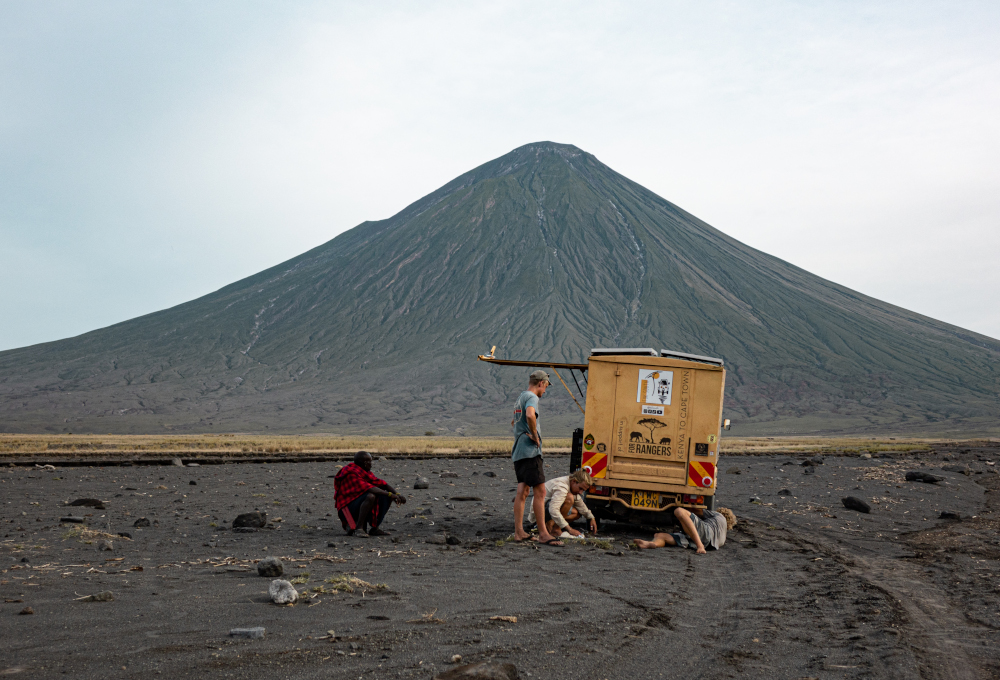
Making it up as they go along
What would take someone in a Landcruiser a day, typically ends up taking Tuk South four days. But along the way they get to camp in little known spots and get that much closer to the wildlands.
If they find somewhere interesting, they stay as long as they want. One such place is Mount Mulanje in Malawi. “We were meant to be up there initially for a week; we ended up spending a month. And we were depressed going down, but our visa was about to run out.”
Their Instagram videos capture a magical world: savannah plains, sheer cliff faces, forests of large cedar trees and cascading waterfalls. Known as the island in the sky, Mount Mulanje is often wreathed in mist. “You’re at the edge of the world and looking down at the clouds. There are blue ribbons of water going past you and purple grasslands soft as a goose feather. There are times in that place where you have to check whether you’re still in reality or not,” says Josh.
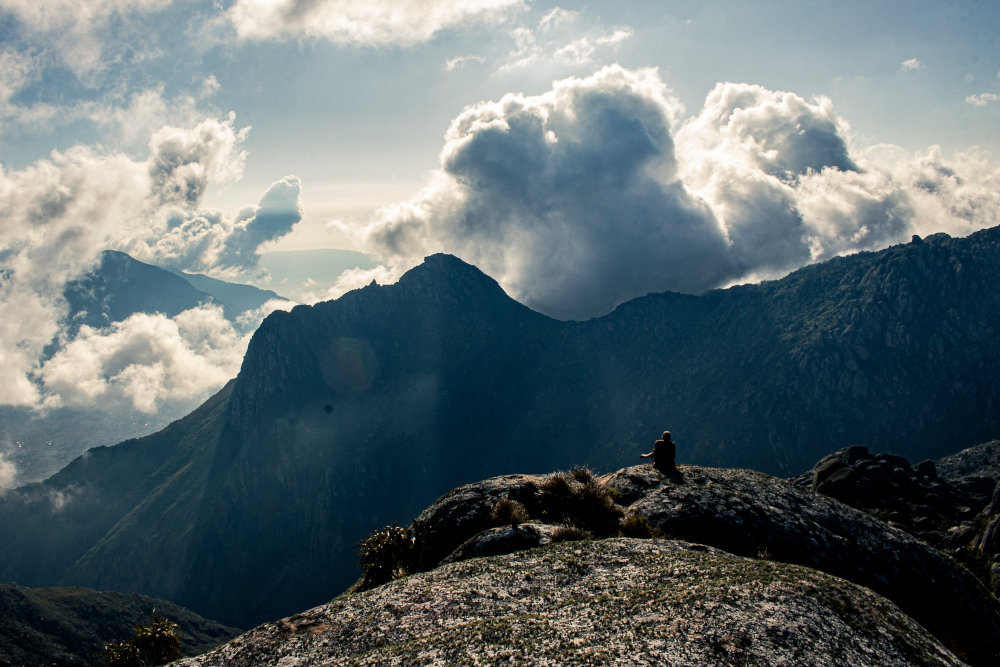
Their tip for Mulanje? Try to time your visit for the dry season as the mountain has the highest rainfall in southern Africa. “The time we went, in May, was spot on.”
“The places that we’ve gone, they are places we know we’ve been blessed to witness.”
Doing it for rangers
Tuk South’s trip has taken them from the plains of Amboseli to the jungles of Lake Tanganyika and now down to the roaring Zambezi. Iconic wild spaces that draw people from all over the world – and that are preserved thanks to the tireless efforts of rangers.
“Rangers are the reason we started this. These guys are the legends behind it all but they’re too far in the shadows. So we’re trying to bring them a bit more into the light.”
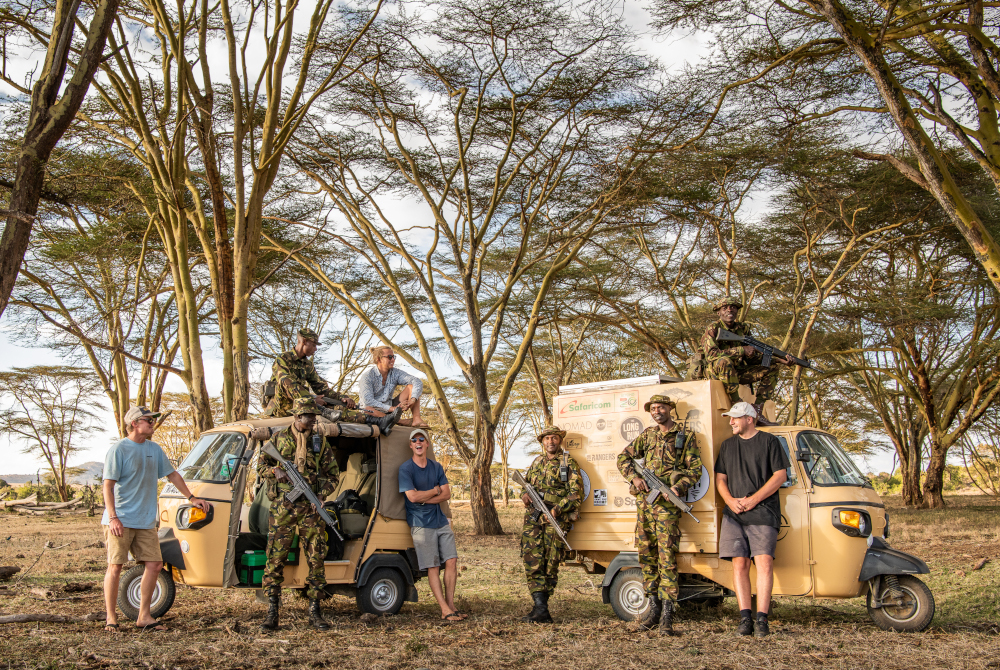
During the pandemic, many rangers saw their wages cut but they carried on regardless because they love the work. On a daily basis, they are putting their lives on the line. And when they get to a point where their bodies start giving up, they could find themselves without any income. That’s why Tuk South supports For Rangers, a charity funding life insurance for rangers and other ways to improve their welfare.
Learn more: https://www.justgiving.com/fundraising/tukoffsouth-for-rangers
“We genuinely think rangers are heroes, holding the frontline of conservation. But rangers will tell you that when people’s lives around the parks get hard, their jobs get hard.”
Clever conservation projects
What the trip has really brought home for the Tuk South travellers is that conservation has to involve the community. Some of the most ingenious initiatives they’ve encountered have revolved around elephants.
In Kenya, next to Tsavo West National Park, the Elephants and Bees Project uses beehive fences to protect farmlands. As a side benefit, farmers can produce elephant-friendly honey for additional income. While in Botswana, millet farmers employ alternative methods like crushed chillies to discourage elephant raids. In this way, ancient elephant migration corridors are protected while the farmers benefit too. Okavango Craft Brewery pays famers a premium for letting animals come through their land on traditional migration routes.
“This is the great thing about taking it a bit more slowly. You can really immerse yourself in some of these projects.”
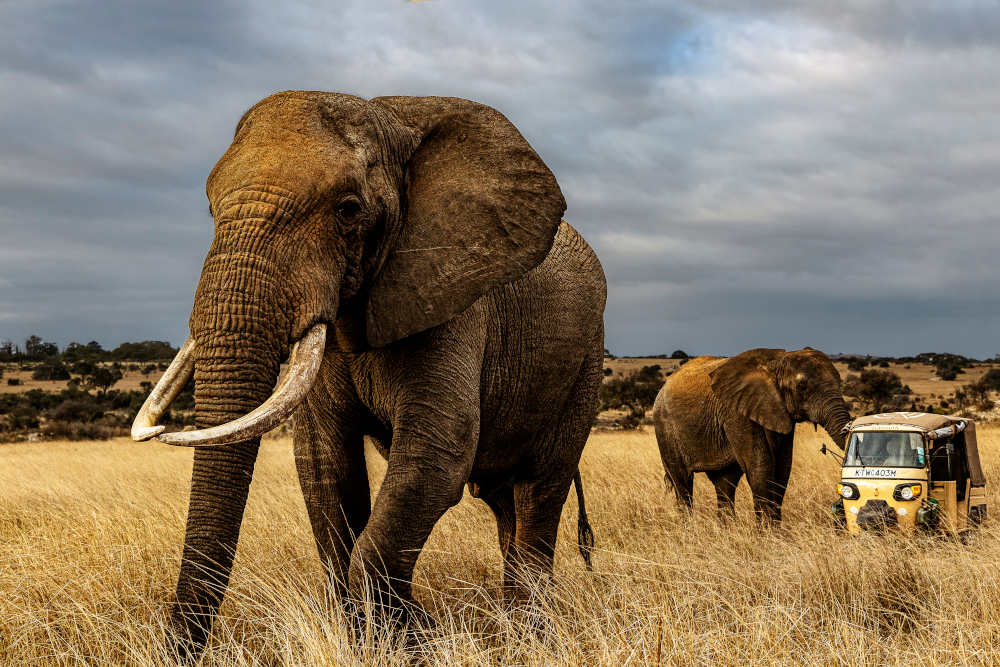
When they set off, they had a goal of reaching Cape Town in time for Afrika Burn 2022. But the way they’re travelling, spending time to capture conservation projects on camera, takes time. And they don’t want to rush their next destinations.
“Namibia has always been a place that we want to spend a big chunk of time. The landscapes there really do boggle the mind. But now we’re approaching summer, so we’re interested to see how capable we are of surviving in summer heat in Namibia,” says Jasper. “We can cover around 600km between fuel stops. Although our a 10L tank is small, we’ve got two 10L jerry tanks at the front. So we’ll have to really calculate our routes quite carefully.”
At this rate, expect to come across them on South Africa’s back roads only next year. “It turns out Africa is very big, tuk-tuks are very slow and there’s just a lot to see.” If you do see them, buy them a drink – they have lots of stories to tell.
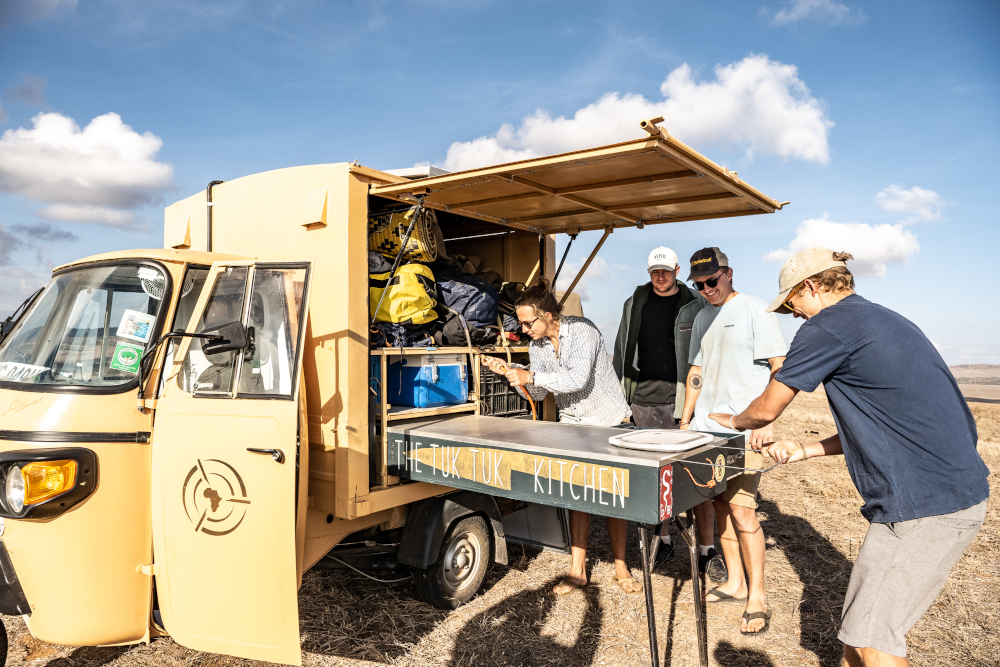
Overlanding tips from Tuk South
You don’t need a lot of stuff. “We’ve got one passenger tuk-tuk and one tuk-tuk van. The van transports all our camping gear and camera equipment and houses the kitchen that Ivo built. We have got rid of so much stuff over time. We have rules: if you don’t use something for a couple of months, it goes. You realise a human being does not need more than a duffel bag of clothes, a tent and a roll mat.”
You don’t need a lot of money. “We’ve been bartering our videography services for places to stay and free meals. We’re about to do a promotional video for a biltong company and they’re going to pay us in biltong. It came out of necessity. When we got to Malawi, we realised wild camping would be really difficult. So we approached some lodges for accommodation in return for videos. Think about your speciality and use that on your way to make your travelling a bit cheaper. Rather spend your money on fuel to cruise further.”
You need a lot of sauces. “We have three food crates: one is now devoted entirely to sauces. When you’re living on the road and eating spaghetti and soy chunks every day, the only way to vary it is with sauce. The chilli sauces of East Africa and Malawi’s kambuzi chillies are delicious. If we had any advice to an overlander who’s worried about space, we’d say give a whole crate to sauces. It’s important.”
For more, follow @tuksouth on Instagram.
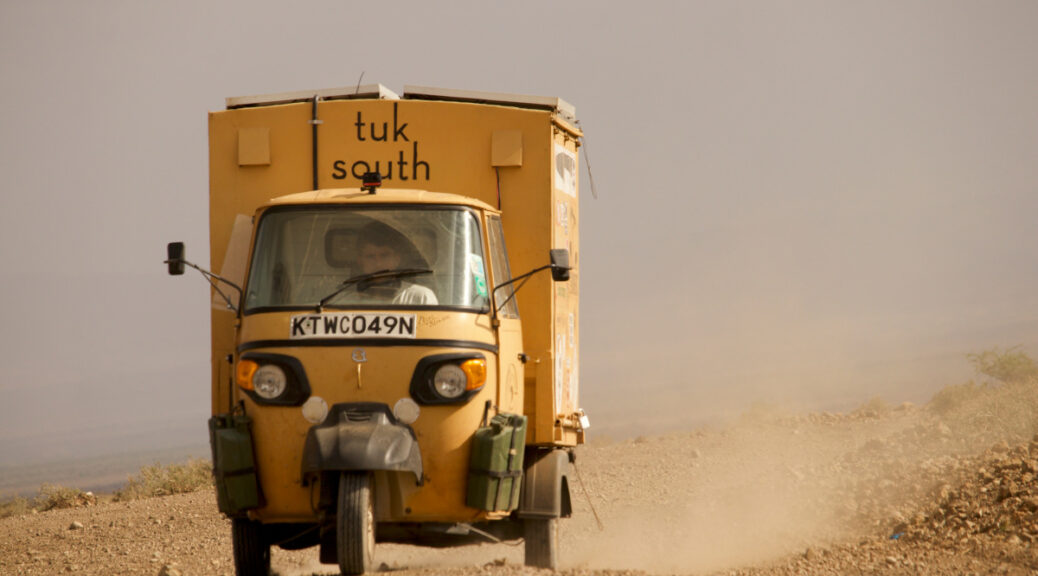

What a great challenge by a wonderful group if guys, best of luck to you and safe travels: Kuhamba Kubona; Travelling makes you wiser. Ed Grosvenor
What a brilliant idea, and I can only imagine how tough the going is. It takes ”doing the scenic route” to a whole new level.
Thank-you for doing what you are doing for the rangers.